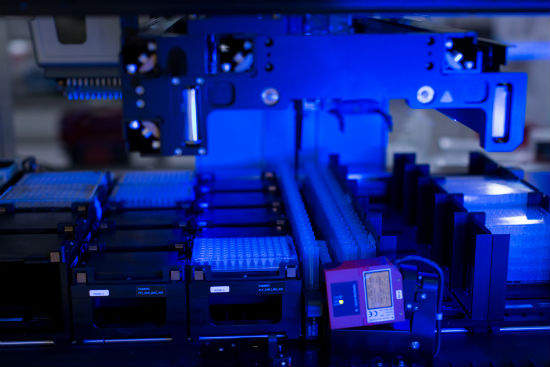RESEARCH TRIANGLE PARK – Morrisville-based Locus Biosciences has entered a credit facility with Hercules Capital, Inc. of up to $25 million to expand the clinical-stage biotechnology company’s drug discovery platform and in-house manufacturing.
The credit facility is a type of loan that allows withdrawals over an extended time, rather than requiring the recipient to reapply each time it needs capital. Locus said money will be made available by Hercules in tranches as the company reaches specific clinical and business milestones.
Locus is developing a new class of precision-engineered bacteriophage treatments for a wide range of bacterial and inflammatory illnesses. The company is targeting three therapeutic areas: infectious disease, immunology and oncology.
Bacteriophages, or phages for short, are viruses that attack bacterial cells by injecting DNA that highjacks the cell’s machinery. The infected bacterium is killed and, in the process, releases scores of new phages that attack more bad bacteria.
“This agreement with leading biotech lender Hercules underscores the potential of the Locus platform,” said Paul Garofolo, co-founder and CEO of Locus. “It also provides access to valuable growth capital that supports the expansion of our discovery platform engine and in-house manufacturing capacity.”
Locus focuses on two categories of biotherapeutics that address significant unmet medical needs:
- Precision products to fight deadly infections, including those caused by multi-drug-resistant bacteria; and
- Engineered phage therapies that use bacteria in the body to deliver therapeutic molecules.
The company’s sweet spot is Type 1 CRISPER-Cas3-enhanced bacteriophage therapeutics. Locus starts with naturally occurring phage viruses that infect and replicate within bacteria. It increases their ability to kill germs by arming them with CRISPER-Cas3 DNA-targeting technology that can precisely remove a specific pathogen.

CRISPER – the acronym for Clustered Regularly Interspaced Short Palindromic Repeats – is a naturally occurring immune system that bacteria use to fight infection.
In recent years, scientists have adopted one form of CRISPER – Cas9 – to edit DNA at specific points in the genome. Locus’ introduction of CRISPR-Cas3 is unique and important because, unlike Cas9, it shreds the target DNA, leading to cell death. That helps destroy residual bacteria that could otherwise survive infection by the bacteriophage and lead to drug resistance.
The Locus technology is a potentially powerful tool that can attack a variety of different infections. And it is believed to be safe for healthy cells because it selectively kills targeted bacteria while leaving good bacteria in the body unharmed.
Bacteriophages have been used to fight pathogens since the early 20th century, but weren’t effective enough on their own to treat serious infections. So they were relegated to the back burner as more successful antibiotics were developed.
Now, rising antibiotic resistance and the emergence of superbugs – along with new research and recent advances in CRISPR technology – have caused scientists and companies like Locus to take a fresh look.
Locus got its start in 2015 as a North Carolina State University spinout. The North Carolina Biotechnology Center supported its early development with $325,000 in loans. In addition, three of the company’s four scientific founders have received NCBiotech grants totaling more than $300,000.
Locus also has built alliances with organizations that include the federal Biomedical Advanced Research and Development Authority; Johnson & Johnson’s Janssen Pharmaceuticals; and Combating Antibiotic Resistant Bacteria Accelerator.
(C) N.C. Biotech Center





























